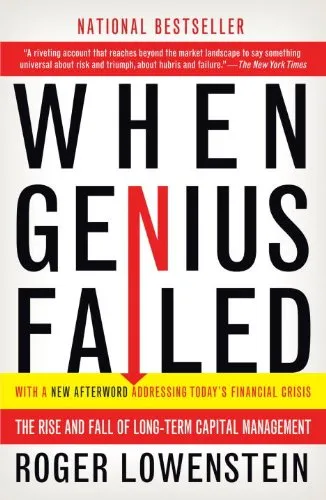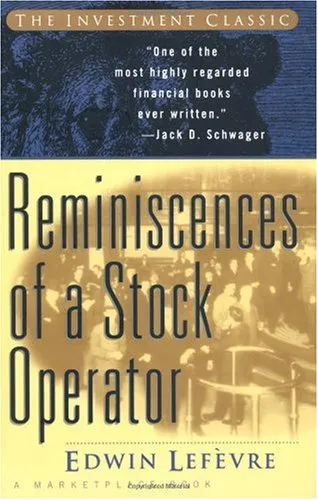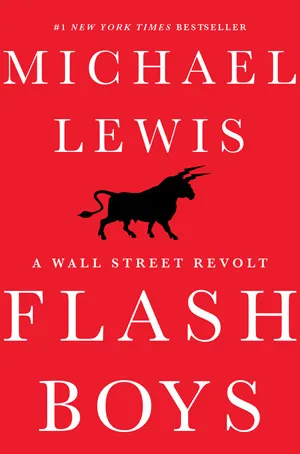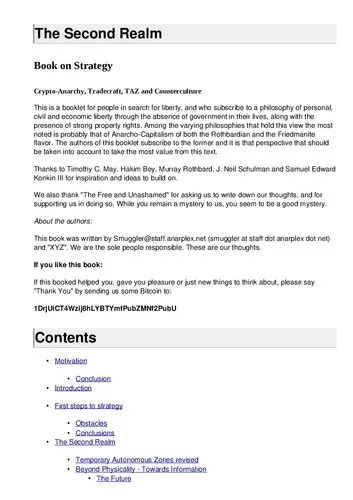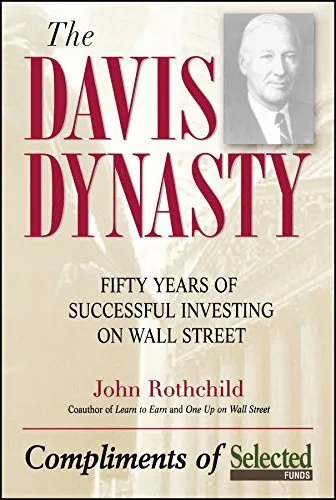When Genius Failed: The Rise and Fall of Long-Term Capital Management
4.5
بر اساس نظر کاربران

شما میتونید سوالاتتون در باره کتاب رو از هوش مصنوعیش بعد از ورود بپرسید
هر دانلود یا پرسش از هوش مصنوعی 2 امتیاز لازم دارد، برای بدست آوردن امتیاز رایگان، به صفحه ی راهنمای امتیازات سر بزنید و یک سری کار ارزشمند انجام بدینکتاب های مرتبط:
معرفی کتاب
کتاب «When Genius Failed: The Rise and Fall of Long-Term Capital Management» نوشته راجر لوونشتاین، داستانی گیرا و هیجانانگیز از صعود و سقوط یک صندوق سرمایهگذاری پیشگام است که با تکیه بر دانشمندان مشهور و نظریههای ریاضی پیچیده، در دنیای مالی به اوج رسید و سپس به شکستی بزرگ منتهی شد.
خلاصهای مفصل از کتاب
این کتاب به بررسی داستان مهیج LTCM میپردازد؛ شرکتی که توسط جان مردیت، رابرت مرتون و میرون شولز که برندگان جایزه نوبل بودند، رهبری میشد. LTCM در اوایل دهه ۱۹۹۰ تاسیس شد و به دلیل استفاده از مدلهای پیچیده ریاضی و مالی به سرعت به شهرت رسید. در ابتدا، مدلهای آنها سودهای زیادی به بار آورد اما در نهایت نتوانست نوسانات غیرقابل پیشبینی بازار را مدیریت کند و در سال ۱۹۹۸ به ورشکستگی کشید که موجب نیاز به مداخله بانکهای مرکزی شد.
نکات کلیدی
- اتکا به فناوری و دانش بدون توجه به ریسکهای احتمالی میتواند مضر باشد.
- شکست LTCM نشان میدهد که حتی بهترین مدلهای ریاضی نیز نمیتوانند تمام عدم قطعیتهای بازار را پیشبینی کنند.
- اهمیت مدیریت ریسک و تنوعبخشی به سرمایهگذاریها در مراحل مختلف بازار.
جملات معروف از کتاب
"این داستان از یک یادگیری بزرگ در وال استریت حکایت دارد، که نشان میدهد هوش و نبوغ محض نمیتوانند بر پیچیدگیِ درونی بازار غلبه کنند."
چرا این کتاب مهم است
این کتاب نه تنها برای علاقهمندان به مباحث مالی و اقتصادی جذاب است، بلکه به خوانندگان کمک میکند تا درک بهتری از ریسکهای مالی و چالشهای مدیریت سرمایه به دست آورند. بحران LTCM به یکی از رویدادهای مهم در تاریخ وال استریت تبدیل شد و دیدگاههای تازهای درباره نحوه مدیریت و ارزیابی ریسکها ارائه کرد.
در نهایت، «When Genius Failed» داستانی الهامبخش از نبوغ و شکست، غیرقابل پیشبینی بودن بازارهای مالی و لزوم آمادگی برای مواجهه با بحران است.
Welcome to an intricate exploration of financial genius and devastating failure in the realm of high-stakes investing. In "When Genius Failed: The Rise and Fall of Long-Term Capital Management," Roger Lowenstein narrates the compelling saga of one of the most renowned hedge funds in history. This book unravels the complexities of the financial world, providing readers with a vivid understanding of how ambition, intelligence, and risk can collide in the world of hedge funds. This introduction will guide you through the key aspects of the book, its core messages, notable excerpts, and its significance in the broader context of financial literature.
Detailed Summary of the Book
"When Genius Failed" chronicles the astounding journey of Long-Term Capital Management (LTCM), which was founded in 1994 by John Meriwether, a prominent Wall Street trader. The firm quickly attracted some of the most brilliant minds in finance, including Nobel Prize-winning economists Myron Scholes and Robert Merton. LTCM leveraged advanced mathematical models to exploit market infinitesimals, promising unprecedented returns with seemingly limited risk. Armed with theoretical rigor and overconfidence in their complex mathematical models, this elite team of traders believed they could conquer the market.
Over the next few years, LTCM's success seemed to affirm its model’s efficacy—delivering massive profits and attracting billions in capital from investors. However, as the book reveals, the firm’s reliance on heavy leverage and their belief in the infallibility of their models led to an escalating spiral of risk. The key turning point came in 1998 when unexpected market fluctuations, exacerbated by the Russian financial crisis, caught LTCM off guard. Their leveraged positions unwound dramatically, leading to a potential collapse that threatened the stability of global financial markets.
Lowenstein's narrative captures the Wall Street drama as the Federal Reserve, realizing the systemic threat posed by LTCM's potential failure, orchestrated a high-stakes intervention to prevent cascading financial chaos. Through meticulous research and compelling storytelling, Lowenstein offers insights into LTCM’s fall from grace, drawing parallels between human hubris and the limitations of financial models.
Key Takeaways
- The Perils of Overreliance on Mathematical Models: The story of LTCM underscores the risk of depending too heavily on quantitative models without considering real-world uncertainties.
- Leverage as a Double-Edged Sword: While leverage can magnify returns, it also amplifies losses, highlighting the importance of risk management.
- The Fragility of Financial Systems: The LTCM crisis illustrated how the failure of a single hedge fund could pose a broader risk to global financial stability.
- Human Element in Financial Decisions: Despite the precision of quantitative models, human judgement and emotional factors invariably play a crucial role in finance.
Famous Quotes from the Book
"The genius of finance lay not merely in unlocking great gains but in trying to accomplish that goal while minimizing exposure to great losses."
"Traders had long learned that in market-world, magic was the hardest trick of all."
Why This Book Matters
"When Genius Failed" is not just a riveting tale of a dramatic financial collapse but serves as a cautionary reminder of the hubris often inherent in financial markets. It is a critical exploration of the intersection between academic theory and market practice. The story of LTCM holds enduring relevance, especially in today’s financial climate where complex derivatives and high-frequency trading continue to shape market dynamics. By dissecting the rise and fall of LTCM, Lowenstein provides insightful lessons on the potential consequences of unchecked risk, making this book essential reading for investors, economists, and anyone fascinated by the workings of Wall Street.
دانلود رایگان مستقیم
شما میتونید سوالاتتون در باره کتاب رو از هوش مصنوعیش بعد از ورود بپرسید
دسترسی به کتابها از طریق پلتفرمهای قانونی و کتابخانههای عمومی نه تنها از حقوق نویسندگان و ناشران حمایت میکند، بلکه به پایداری فرهنگ کتابخوانی نیز کمک میرساند. پیش از دانلود، لحظهای به بررسی این گزینهها فکر کنید.
این کتاب رو در پلتفرم های دیگه ببینید
WorldCat به شما کمک میکنه تا کتاب ها رو در کتابخانه های سراسر دنیا پیدا کنید
امتیازها، نظرات تخصصی و صحبت ها درباره کتاب را در Goodreads ببینید
کتابهای کمیاب یا دست دوم را در AbeBooks پیدا کنید و بخرید
1473
بازدید4.5
امتیاز0
نظر98%
رضایتنظرات:
4.5
بر اساس 0 نظر کاربران
Questions & Answers
Ask questions about this book or help others by answering
No questions yet. Be the first to ask!
